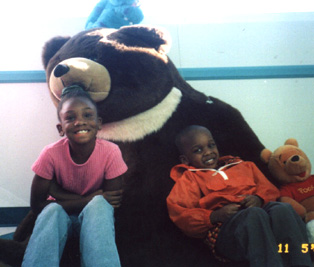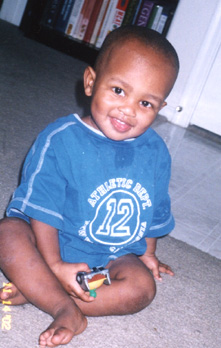

Oregon--The Ultimate Utopia?
1991 was going to be a good year. I had just finished my sophomore year of high school in sunny Pasadena, California. I was in all honors classes and I was having a lot of fun playing the violin and xylophone in the schoolís orchestra and band. My orchestra teacher informed me that next year I would be first chair. I was so excited. Although my school was considered the ìwhite schoolî in my area, it was composed of at least 20 percent black students, 20 percent Chicano or Mexican students, and 10-15 percent Armenia or middle eastern students as well as others. Race was not something that we really focused on in a negative way. But, it was a topic of frequent conversation in my classes. We all were curious when we saw an ambiguous looking individual and would dryly ask, ìWhat are you?î. Pretty rude sounding, I know, but we were very close and we would make jokes about it or gloat when we could correctly identify someoneís racial identity. I did not know of any racism going on in California.
I was the typical California girl. Although I am not white or blond, I had a very carefree attitude about life. Life was good for me until I heard the news. We were moving to Oregon. Just saying that word O-R-E-G-O-N still gives me chills. My friends were all sad when I told them the bad news. People constantly told me horror stories about skinheads and KKK being there. I did not want to go. But, of course, I had no choice. My father worked for First Interstate Bank (now Wells Fargo) and they were transferring him. It was either Oregon or Arizona, I guess he did not want to deal with 120-degree weather, so he chose Oregon. We moved to Aloha, Oregon just before the start of my junior year of high school.
By the time the first day of school came around I was a nervous-wreak. Not only was I one of 15 black students at a school of 1500, most of the other black students were bi-racial and born there. I stuck out like a sore thumb. Thank God that they had people in the school that volunteered to eat lunch with the new kids. I couldnít face eating alone. I remember sitting in the cafeteria looking for someone I could relate to, some friendly face, but I didnít find one. Everyone was doing his or her own thing. They were pretty lucky.
My health teacher, Ms. Webb, seemed to be concerned about me from the first day. After class she told me to let her know if I ever needed anything. Another teacher pulled me to the side and told me the same thing. That scared me. I wanted to know what had happened for these teachers to be so concerned about me. In my history class there was a sign on the wall that said ìRacism-free zoneî. That was not comforting. Being in an atmosphere with almost no one who looked like me made me become self-conscious about my skin and hair, my physical differences. Before I did not think there was anything remarkable about how I looked, but now nothing seemed to be right. If I could have changed my appearance to look more like the general population I would have. I am such a shy person, I hated standing out.
As the year progressed I began to notice how everything I saw or read was about racism. This was 1992, when all of the talk shows had KKK members on telling how much they hated black people. I was so angry. They even had little babies in Klan outfits. Then, I started to wonder about the students at my school, about all of those people who looked at me but did not speak or smile. Did they have Klan outfits at home too? In my English class every book we read had the N word in it or one of the main characters was a racist. We read the Great Gatsby, Huckleberry Finn, and some short stories. I lost my faith in everyone at the school when one of my white friends got up in front of the class to give a report about Huckleberry Finn and used the N word just like they did in the book. I didnít understand how they could be so insensitive. I discovered that they did not know how much pain is associated with that word.
Ms. Webb, my health teacher, offered to allow me to choose who my partner would be in class when we did the ìmock marriageî portion of the class- we were to work with another student pretending that we were married and doing budgets, and other activities like pretending that we had children to take care of together. Iím not sure why she did this. But, I didnít choose because I felt as if she was giving me the privilege because she felt sorry for me. She must have thought that it would be awkward that I would be ìmarriedî to someone who was white.
Later, she called me into the principalís office because she felt that I had a problem with my anger. My English teacher had told her about some disturbing hostility in one of the papers I wrote about a character in one of the books that we had read. In the paper I said things like he was a bastard, and other not so nice phrases (no profanity). I was simply trying to say that I did not agree with his thoughts, actions, and beliefs. They thought that I might be having some other problems so they called my parents.
When I talked to my parents the problem only got worse. My dad was very upset with me. He had lived through segregation in Florida where he grew up. His family was very poor because they had 15 children and then his dad decided he didnít want to be with his mom anymore. My grandmother refused to take welfare, so their family did not have much food, clothes, and my father even went to school without shoes. So when I talked to him about not liking school because there were not many black people there, he was not very understanding. He did not want me to let others affect how I felt or thought about myself. I can understand that now, but I was young and going through identity issues in a place where I felt I didnít fit in anywhere. I felt my parents had turned their backs on me as well.
After the school year was over, I made the decision that I would not go back to that high school. Although the town that I lived in, Aloha, Oregon, offered no additional diversity I felt better because I could keep to myself and only had to endure the constant stares when I went to the store or to work.
Since then I have thought a lot about the issues that I encountered in Oregon. I wonder what are the effects on black children being raised in predominantly white schools or neighborhoods. I have children myself now and I am dealing with some of the same issues here in Arizona (but it is not as bad here). I wonder why they do not integrate the schools in Oregon and Arizona the way that they do in California? I guess most people donít think much about this issue but it is a very significant one for people who are the minority. The lessons and messages our children learn at a very young age affect what they will do in the future.


Return to Personal Memory Ethnographies
homepage